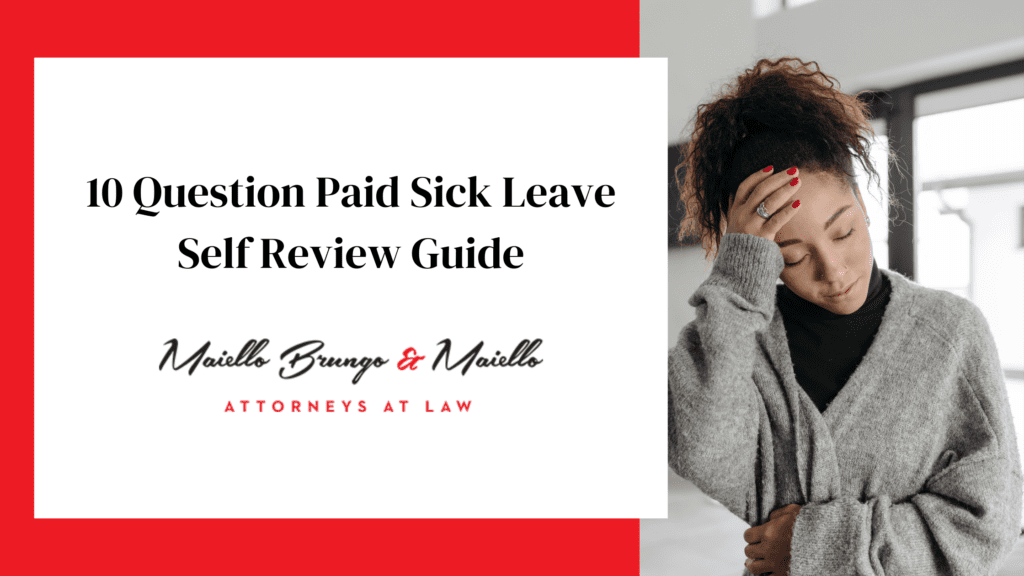With the new Pittsburgh paid sick leave ordinances adopted in March 2020 and in Allegheny County in September 2021, businesses should be taking this time to review their paid time off policies to ensure compliance. Maiello Brungo & Maiello, LLP would like to present you with this 10-Question Self-Review Guide to help your business steer clear of any possible infringements concerning these new changes.
1. Does my Business Have to Provide Paid Sick Leave?
It depends. Is your business located either in the City of Pittsburgh or in Allegheny County but outside of the City?
I’m in the City of Pittsburgh:
Yes. You must provide paid sick leave.
I’m in Allegheny County but not the City of Pittsburgh:
You must provide paid sick leave only if you have 26 or more employees, not counting independent contractors and seasonal workers.
2. How many hours of sick leave do I have to provide?
Again, it depends. Are you in the City?
For businesses located in the City of Pittsburgh, the maximum number of hours that you must provide will depend on your number of employees:
If you have 15 or more employees: You must provide up to 40 hours.
If you have less than 15 employees: You must provide up to 24 hours.
For businesses located in Allegheny County but not the City of Pittsburgh:
You must provide up to 40 hours if you have 26 or more employees.
3. At what rate must these hours accrue?
For businesses located in the City of Pittsburgh: 1 hour for every 35 hours worked to a maximum of 40.
For businesses located in Allegheny County but not the City of Pittsburgh: 1 hour for every 35 hours worked (unless your written policies establish the accrual of sick time in fractions smaller than an hour) to a maximum of 40.
In both instances, accrued sick time must be carried over to the following year unless you choose to “frontload” the sick time by providing a fresh 40 hours at the beginning of the next year. If you choose to frontload the time, then you do not need to track the accrual, although it is still recommended that you do.
Also, when an employee leaves the company, you are not obligated to reimburse that employee for unused sick time that they have accrued, unless it is already your policy to do so.
4. When do I have to begin providing paid sick leave?
For businesses located in the City of Pittsburgh:
Immediately.
For businesses located in Allegheny County but not the City of Pittsburgh:
December 14.
5. Do I have to give additional paid leave time or is my current paid time off policy good enough?
If you already provide paid leave (such as PTO) which gives an employee, at least, the same amount of time as the required hours under the new law, then you do not need to provide additional leave, so long as the employee can use the PTO as paid sick leave.
6. How can an employee use their accrued sick time?
Employees must be allowed to use paid sick time for:
- An employee’s or family member’s mental or physical illness, injury, or health condition; need for medical diagnosis, care, or treatment of a mental or physical illness, injury or health condition; or need for preventative medical care.
- Closure of the business due to a public health emergency.
- An employee’s need to care for a child whose school or place of care has been closed due to a public health emergency.
- An employee’s need to care for a family member when the family member’s presence in the community would jeopardize the health of others due to exposure to a communicable disease (whether or not the family member has actually contracted the communicable disease).
7. Do I have to keep records or provide notification?
Yes. Records must be maintained for 2 years, showing hours worked and sick leave taken. These records must be made accessible to the enforcement agents of the City and County.
Employers must also provide written notice to employees of the availability of sick leave.
8. How should I treat a new employee?
New employees should begin accruing time as of their start date (unless they are hired before the law becomes effective), although you can restrict usage of their time until after 90 days of work.
9. Can I require documentation from the employee proving that they are using the sick leave for legitimate purposes?
Yes, as long as the employee is absent for three or more full, consecutive days.
Also, keep in mind that you may not require an employee to disclose details relating to their medical condition (or a family member’s condition) as a requirement for providing the paid sick leave.
10. What is the penalty if I fail to meet these obligations?
An employer who willfully violates either of the ordinances will be subject to a fine in an amount not to exceed $100 for each separate offense. Additionally, the employer could be required to pay full restitution to the employee for any lost wages and benefits.
If you have any questions regarding the new Pittsburgh paid sick leave law, please contact a member of the Maiello Brungo & Maiello, LLP employment law team. Our employment lawyers are happy to assist you.


